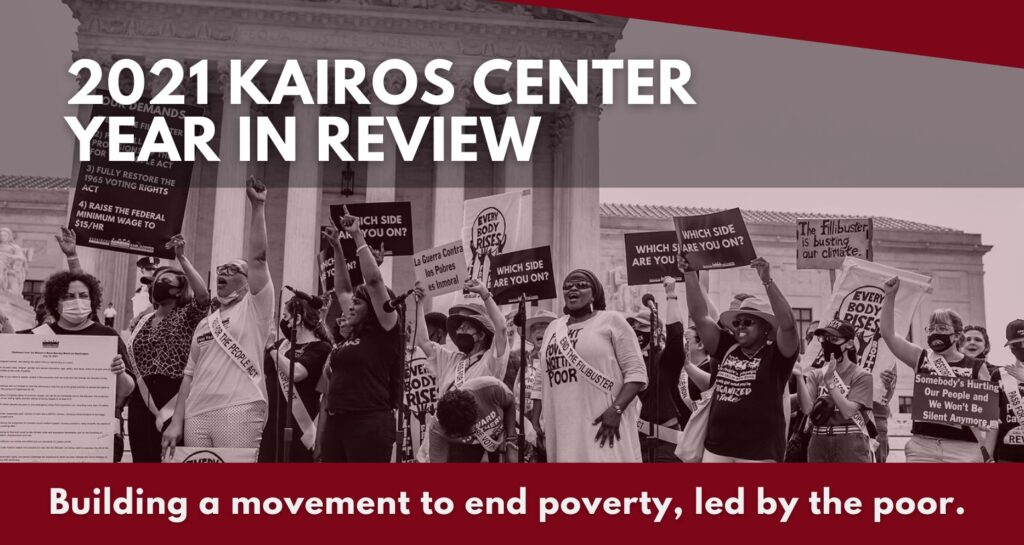
It has been a hard and yet still hopeful year. Throughout 2021, we at the Kairos Center for Religions, Rights, and Social Justice have stayed focused on developing and uniting community and religious leaders around a bold vision of equity and abundance for all.
Our work anchoring the Poor People’s Campaign, alongside Repairers of the Breach, has kept us busy from organizing weekly Moral Monday programs throughout the first 100 days of the Biden/Harris Administration to inspiring a Congressional Resolution focused on fully addressing poverty and low wages from the bottom up. This summer we organized a season of nonviolent direct action and kept the pressure on our elected representatives, especially Senators Manchin and Sinema, well into the fall. We are now preparing for the Mass Poor People’s and Low-Wage Workers’ Assembly and Moral March on Washington on June 18, 2022.
We’re excited to share more of our activities and accomplishments with you. Thanks for your ongoing support.

Launch of Third Reconstruction Resolution
In May, the Poor People’s Campaign joined members of the Majority Leader’s Task Force on Poverty and the Congressional Progressive Caucus for a press conference to announce a congressional resolution entitled, Third Reconstruction: Fully Addressing Poverty and Low Wages from the Bottom Up.” This non- partisan resolution comes as a response to years of movement-building, including the important work of the Kairos Center, to create the collective resolve necessary to implement real and transformational legislative action.

Mass Poor People’s and Low-Wage Workers’ Assembly and Moral March on Washington
We gathered in Raleigh, North Carolina on June 21, 2021 for an online assembly where President Joe Biden sent a video message pledging that ending poverty is not just an aspiration, but a theory of change to build from the bottom up. All roads now lead to Washington DC for a Poor People’s and Low- Wage Workers’ Assembly and Moral March on Washington, the largest gathering of poor and low- income people in US history in Washington DC on June 18, 2022.
Poor People’s Campaign Moral Action Congress
In October, Rev. Dr. Liz Theoharis and Attorney Roz Pelles co-chaired and organized the Poor People’s Moral Action Congress where we gathered nearly 1000 Poor People’s Campaign activists from all 50 states to focus on building power and organizing from the bottom up. The Congress included an online town hall featuring Rep. Pramila Jayapal, Rep. Barbara Lee, public health officials, faith leaders, economists and poor and impacted leaders from across the country.
Summer of Action

Georgetown to Austin March, Women’s Moral March, Aug 2, targeted actions directed at Manchin and others
Starting in July, with dozens of partner organizations, we launched a season of Nonviolent Moral Direct Action. The season included the Women’s Moral March on Washington on the anniversary of the Seneca Falls Women’s Convention; a Selma-style march from Georgetown to Austin, TX with a rally of over 10,000 at the Texas State Capitol and Willie Nelson performing for the first time since Covid hit; a Moral Motorcade on Manchin in West Virginia on the 100th anniversary of the Battle for Blair Mountain; and dozens of actions in Washington DC and in states across the country involving thousands of people engaging in nonviolent civil disobedience.
We held up demands to end the filibuster, raise the federal minimum wage to $15/hour, protect and expand voting rights, and pass permanent protections for all 11 million undocumented immigrants.
The season continued into the fall where we have put pressure on Congress to pass a bold Build Back Better Agenda as a first step to investing in the people, planet and our democracy, protect our democracy by passing the John Lewis Voting Rights Advancement Act, the For the People Act, the Freedom to Vote Act, and truly put forward policies that lift from the bottom so that everyone rises.
Poor and Low-Income Voter Study
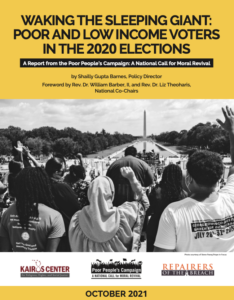
Ahead of the 2020 vote, the Poor People’s Campaign launched an historic nonpartisan voter outreach drive across 16 states, reaching over 2.1 million voters. The report, written by Kairos Policy Director Shailly Gupta Barnes, examines this drive and the role of poor and low-income voters in the 2020 elections and concludes that this multiracial voting bloc had an important impact on the results. This cuts against the commonly-held perspective that poor and low-income people are apathetic about politics or inconsequential to election outcomes, and shows the critical potential of this “sleeping giant” for future elections if poor and low-income people are organized into a moral fusion movement that votes.
Freedom Church of the Poor
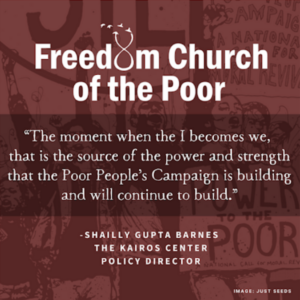
The Freedom Church of the Poor is almost two years old! Founded in May 2020, at the onset of the pandemic, this growing spiritual home for the movement meets online every Sunday at 6pm ET. Our services bring together leaders from front-line struggles of the poor, scholars, workers, artists, and many more to learn, to pray, to sing, and to confront the false moral narrative that justifies poverty, blames the poor, and tells us there isn’t enough for all to thrive. This year we were honored to receive recognition from the Presbyterian Church USA as a New Worshipping Community.
Just a few of this year’s many highlights include: a service led entirely by the Deaf and hard of hearing community; Yom Kippur and Sukkot services led by Freedom Shul of the Poor, a powerful Dia de los Muertos service with La Iglesia del Pueblo; and the “Winter Offensive” from Thanksgiving through Martin Luther King Day. The Winter Offensive is an organizing drive and collaboration with the National Union of the Homeless and many other organizations lifting up struggles of the poor and seeking to confront and reclaim the true meaning and spirit of the holiday season.
La Iglesia del Pueblo
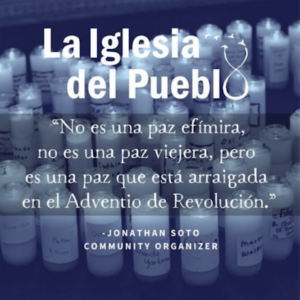
In September, La Iglesia del Pueblo celebrated its first anniversary. This dream of a handful of people is a reality today: to provide a Spanish-language spiritual home for leaders of our movement and engage our communities in the work and mission of the Poor People’s Campaign. Latinx communities, like African Americans and other minorities, are affected “first and worst” by the evils that affect all of society: racism, poverty, militarism, ecological devastation and the distorted moral narrative of the religious right.
We are also among the communities most affected by the COVID-19 Pandemic. We are called essential, but in truth, we are treated as dispensable. La Iglesia del Pueblo comes together with the certainty that God is always on the side of the poor. It is a place where our dignity as human beings is exalted and protected; where everyone is welcome without regard to faith or non-faith, race, or sexual/gender identity. As one of our leaders puts it, “For me, La Iglesia is that safe space where we can bring our marginalized identities, our questions and doubts and afflictions, with the confidence that in community these will be valued, validated and alleviated.”
Among the many blessings and achievements of this first year, we can count our monthly joint service with our sister congregation, Freedom Church of the Poor, where communion is celebrated and shared. We are further blessed by the meaningful relationships we’ve developed with churches and organizations from Latin American countries such as Venezuela, the Dominican Republic and Ecuador. Like us, these communities are embarking on the construction of a more just society, a society where everyone fits. Everybody in, nobody out!
Shifting the Narrative
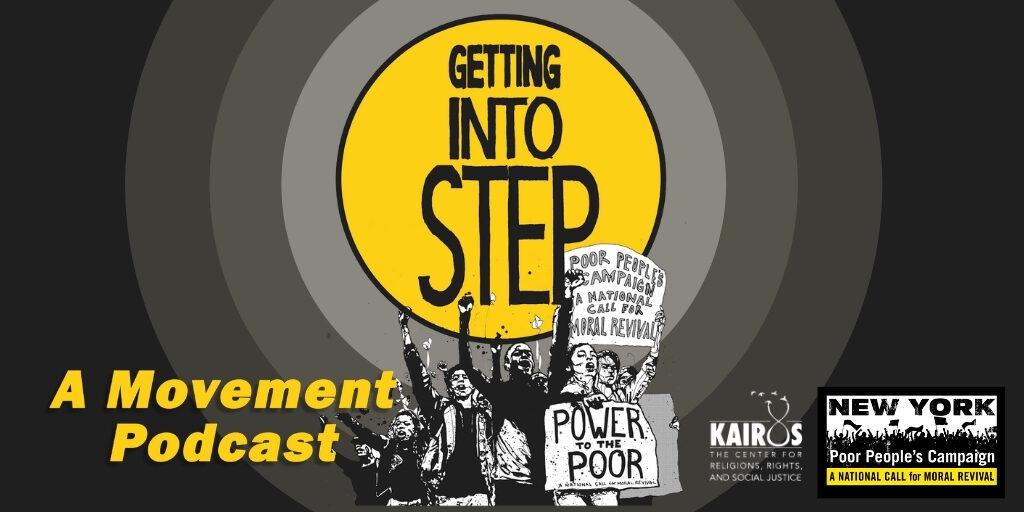
Throughout 2021, the Kairos Center shifted the dominant narratives about poor and low-income people by intentionally offering a different understanding of the world we live in and why more than 140 million people are poor and low-income.
This year, we redesigned our website at kairoscenter.org, which features lots of original content and is a way to stay up to date on the work of the Kairos Center and the Poor People’s Campaign. We have also substantially grown our reach on social media platforms Instagram, Facebook and Twitter. This spring, we launched the Getting Into Step podcast, a collaboration with the New York State Poor People’s Campaign, that highlights the voices of leaders building a movement to end poverty.
Kairos Center Director Rev. Dr. Liz Theoharis has been featured consistently in local, statewide and national press independently and for work with the Poor People’s Campaign. She also keynoted several conferences, served on multiple panels and led actions on Capitol Hill and in states that garnered much media attention. Rev. Theoharis was published in The Washington Post, USA Today, The Nation, Ms. Magazine, The Progressive, Religion News Service, Sojourners, the Grio, Salon, Slate, and more, and her monthly column with Tom Dispatch, offering a moral framing for current events and policy, is syndicated widely. In addition, Policy Director Shailly Gupta Barnes was a consistent contributor in the policy space, serving on several panels and as a frequent podcast guest. While Rev. Theoharis and Shailly both contributed many op-eds this year; a highlight was having Kairos kids Indi Barnes and Sophia Theoharis Caruso (along with Isabel Peterson from Repairers of the Breach) write a powerful op-ed in Teen Vogue.
Launch of We Cry Justice

We Cry Justice: Reading the Bible with the Poor People’s Campaign, published by Broadleaf Books (October 2021), edited by Rev. Dr. Liz Theoharis with a Foreword by Rev. Dr. William J. Barber II, is a revolutionary text that offers a unique perspective on some of the most radical passages in scripture. More than thirty contributors spanning different races, genders, geographic locations, professions, and more were brought together to do a deep dive into the true liberation of the gospel, and what it means for poor and low income people. This devotional breathes new life into familiar passages, and centers righteous justice and liberation for poor people as the primary lens through which the Bible is read. In a world roiled by poverty and injustice, Scripture still speaks.
Arts and Culture
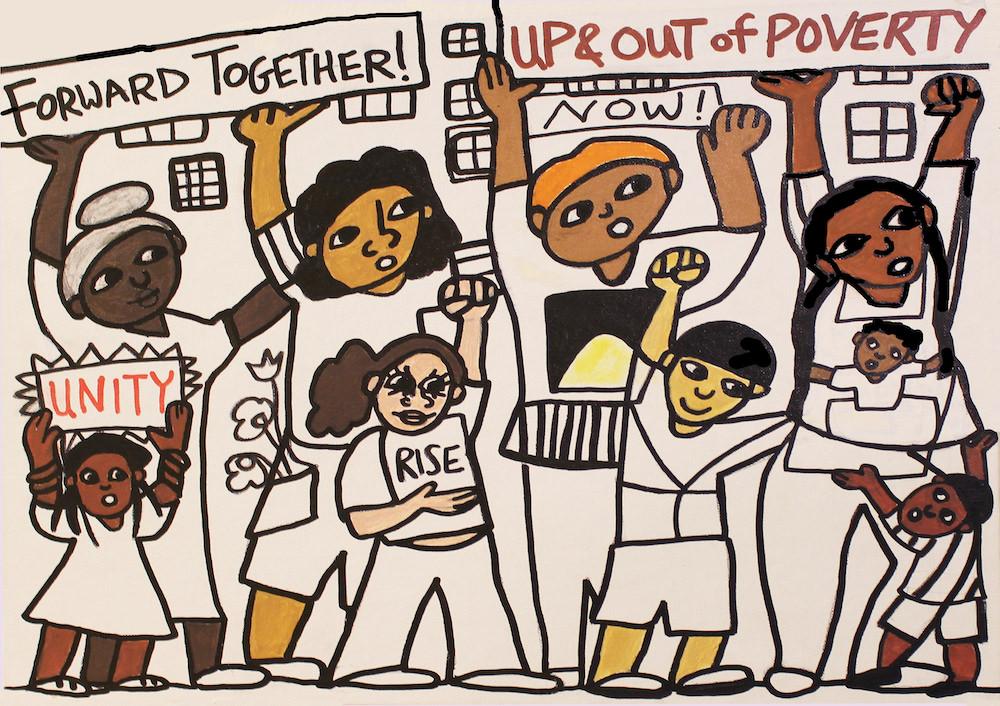
We have also been working on an arts companion project to We Cry Justice, with music and visual art interpretations of the text. The project includes over 20 artists from across the country and will be released in the new year. Arts and culture work is central to movement building; it amplifies our stories and grounds us in our mission. All of 2021 was made more powerful by visual artists and theomusicologists who developed beautiful signs, banners, songs, and many other forms of art to share our message.
Check out our new cultural arts videos that capture the power of our movement arts work in action:
Moral Policy = Good Economics
This year, as the country inaugurated a new Administration and the 117th Congress, our policy team kept pushing forward our core issues, analysis and narrative. For the first time in decades, poverty was on the national agenda and President Biden promised to make ending poverty a “theory of change” in his Administration. During the first 100 Days, we organized online and in-person Moral Mondays and weekly policy calls to highlight our policy priorities: from the expansion of the Child Tax Credit and childcare to housing, water, health care, voting rights, immigration justice and more. Inspired by the work of the Poor People’s Campaign, members of Congress introduced a Third Reconstruction Resolution in May to take up these priorities. For this and more, Rev. Liz was recognized by Speaker Nancy Pelosi for her organizing and leadership in these times.
In July, during the season of action, our policy director, Shailly Gupta Barnes, testified at the inaugural hearing of the House Select Committee on Economic Disparity and Fairness in Growth. We also participated in a series of roundtable discussions on Dismantling Racism and Militarism. Following these discussions, Jarvis Benson created a militarism video series, a set of five interviews on foreign policy, immigration, policing, indigenous rights and veterans that was released this fall. We also published an article with the Economic Policy Institute for American Educator, the journal of the American Federation of Teachers, titled “Moral Policy = Good Economics,” and our regular policy briefings on relevant issues like the poverty measure, Third Reconstruction, Build Back Better agenda and more. Finally, we launched a series of Kairos Survival Summits. This set of strategic discussions brings stakeholders together on key issues facing poor and low-income people. Our first summit on food justice was held in September and our second, focused on housing, is in December.
Survival Summits
In September, the Kairos Center held our Survival Summit on food justice, the first in a series of strategic dialogues we are organizing. Each summit takes up a key economic issue confronting poor and low-income people: hunger, homelessness, a shredded social safety net and the denial of health care. At the inaugural meeting, we brought together grassroots organizers, faith leaders, artists and cultural workers, researchers and policy experts to share how the terrain around food justice has changed over the past 18 months, including new opportunities, breakthroughs and challenges, and how to coordinate our efforts towards building the power and organization of the poor, so as to realize and meet all of our needs. We concluded with a public event featuring Rev. Dr. Liz Theoharis, Raj Patel, Keith Bullard, Alison Cohen and Lu Aya. Our next Survival Summit will be on the Right to Housing on Thursday, December 9th.
Recognition

In 2021 our Director, Rev. Dr. Liz Theoharis, along with the Rev. Dr. William Barber II, for their work with the Poor People’s Campaign, were awarded: The 30th Annual Freedom Award by the National Civil Rights Museum, The Hunger Leadership Award from the Congressional Hunger Center, and The Adela Dwyer-St. Thomas of Villanova Peace Award.